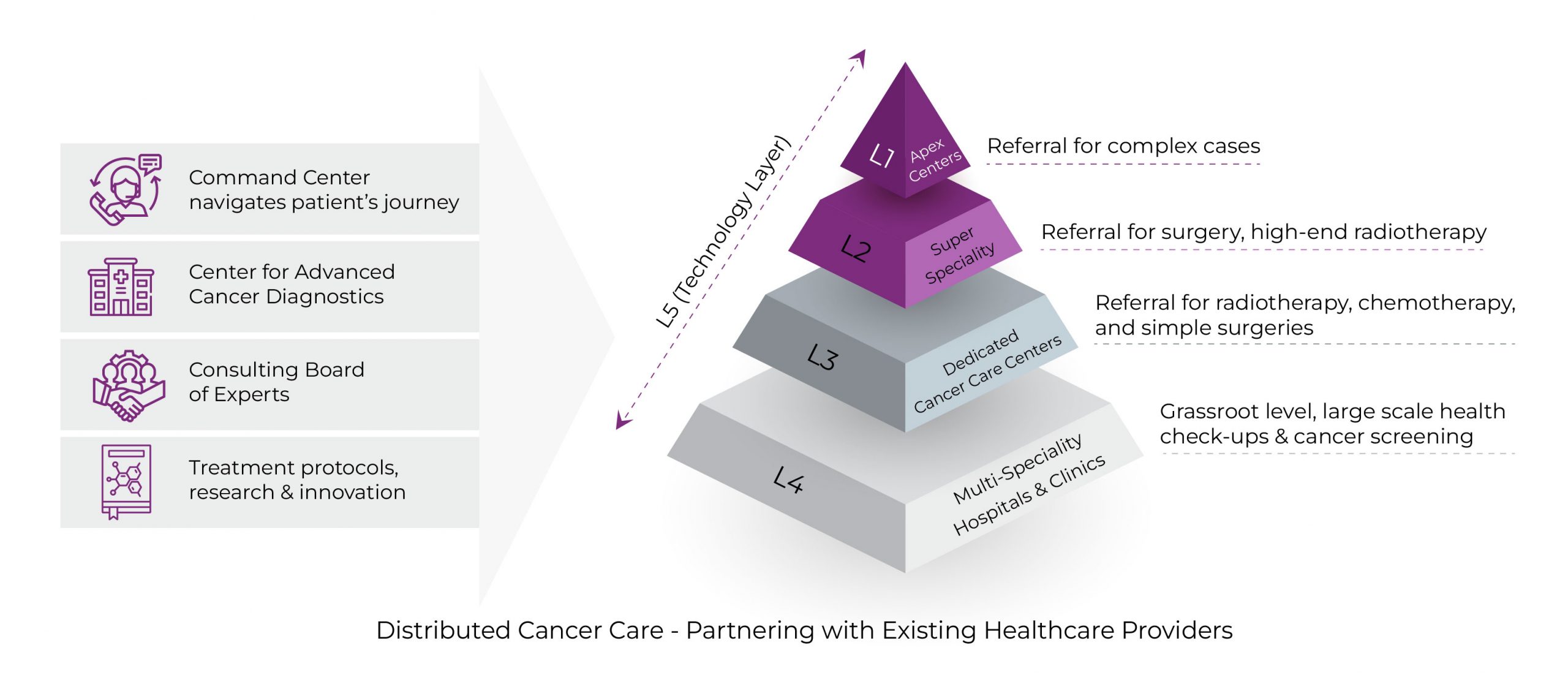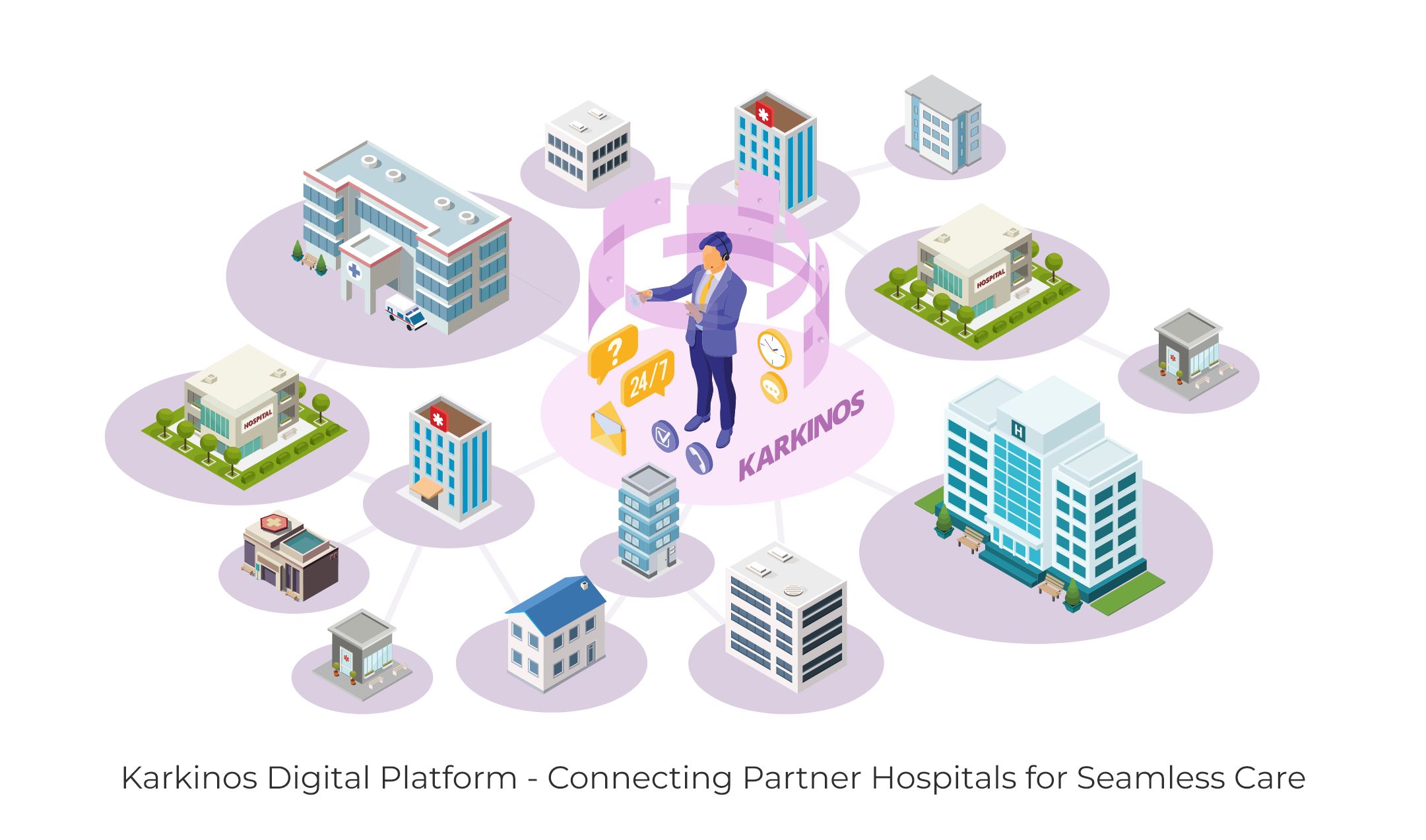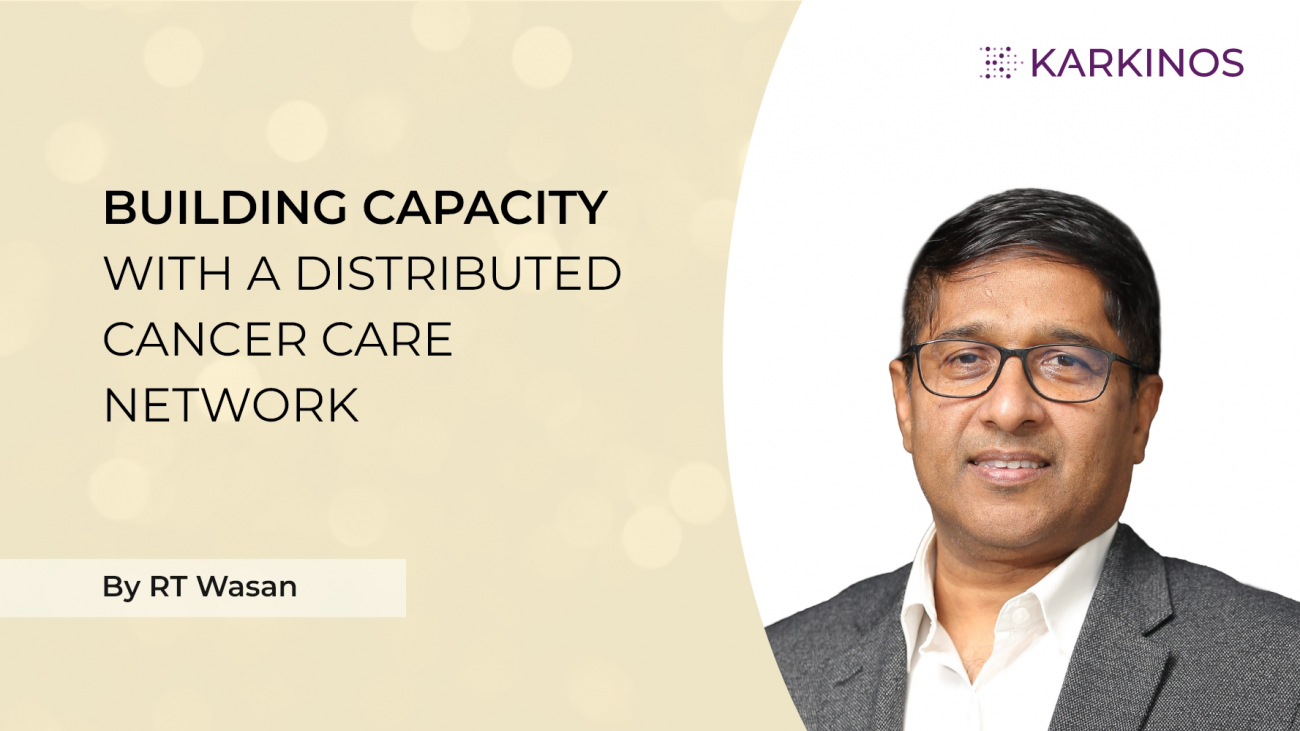Addressing accessibility and affordability in cancer care with a distributed approach
By RT Wasan, Chief Network Officer, Karkinos Healthcare
India has one of the world’s highest numbers of new cancer cases added annually. An estimated 14 lakh new cases are reported every year, and nearly 8.5 lakh deaths annually are reportedly attributable to cancer alone in India and these figures can be as much 3 times higher in reality given the lack of adequate capturing of such data across the country. Unfortunately, it is predicted that this cancer incidence rate would only rise in the upcoming years, potentially affecting 1 in 10 Indians (Globocan 2018). There is a large gap in the provision of cancer care, mainly due to the lack of adequate infrastructure, facilities, and the availability of oncologists.
There are a multitude of challenges faced by cancer patients and care providers alike. As it is, cancer is not just one disease and there is no one solution that fits all to solve the problem. This problem is further compounded by many other issues like the skew in resources – more than 60% of the resources are centered in the top ten most populous metros/tier 1 cities. Be it for diagnosis or for treatment of cancer, people are compelled to travel long distances (often an 8- to 10-hour journey) from their location mostly foregoing their daily earnings. Given that cancer diagnosis, staging, and treatment involve multiple visits and stretch over many months, long distance and loss of pay means that people don’t complete the entire treatment protocol, thus aggravating the disease and adversely impacting the country’s mortality rates.
Further, 75% of cancer cases are discovered in advanced stages (III & IV), resulting in a 50% increase in the 5-year cancer mortality rate (Source: ICMR) further escalating the cancer burden in India. Late detection and its resultant increased cost of treatments are also traced back to lack of availability of care closer to where people live and work.
Therefore, in a country like India, where the burden of the disease is high and because of the skew in care provision, while tremendous efforts are being put in identifying the different types of cancers and their precise treatment for each patient, a Distributed Cancer Care approach is an absolute necessity to take cancer care closer to the people (including creating awareness about cancer and helping detect it early). At Karkinos, we are working towards setting up the country-wide Distributed Cancer Care Network to provide citizens with quality cancer care closer to home, which is also affordable and accessible.
Tenets of a distributed cancer care model proposed by Karkinos Healthcare
One of the first objectives is to create awareness and to help detect cancer early, and towards this Karkinos Healthcare is partnering with hospitals at various tiers/levels, corporates, and civil society organizations in spreading awareness about the importance of regular cancer screening and also to carry out mass community risk assessment programs. An innovative digital tool has been developed and deployed to identify high risk individuals based on a peer reviewed and curated risk assessment questionnaire. This is followed by opportunistic screenings through a network of diagnostic centers and screening centers (typically clinics and nursing homes) to screen those identified as being at high-risk.

Karkinos Healthcare is setting up a Distributed Cancer Care Network (DCCN) of service providers across the country to build capacity at scale and take cancer care closer to the population. The network takes the shape of a four-tier pyramid.
- At the bottom of the pyramid is a wide network of L4 multi-specialty hospitals and clinics that do not have dedicated oncology services. Karkinos Healthcare intends to partner with such hospitals to set up the Karkinos Cancer Centers, which provide screening services, oncologist consultations, day care chemotherapy and minor surgeries.
- The next tier of L3 cancer care centers comprises a network of large multi-specialty hospitals or dedicated cancer care centers providing all the three major modes of treatment including surgery, chemotherapy and radiotherapy. Around 60% of all cancer patients require radiation therapy as part of their treatment, however the country possesses barely around 615 radiation therapy machines, largely present in the metros and tier one cities and as a result only about 25% of the cancer patients avail this treatment and at much higher costs associated with traveling to these large cities for treatment.
- The next tier of L2 Hospitals comprises large super specialty hospitals attached to medical colleges catering to a huge patient base at such centers and help train the next generation of clinicians in oncology and close the research-action gaps.
- Finally at the top of the pyramid is the L1 Apex Hospitals that are dedicated cancer care centers, which not only provide for all complex cancer care treatment but also carry out significant research work in the field of cancer. Partnerships with these institutions allows Karkinos Healthcare to share learnings in service delivery, standardizing protocols, etc.
Karkinos’ digital technology-led support to partner hospitals
An integrated, technology-led, managed oncology platform has the potential to change the course of cancer management in India. Such a platform benefits all stakeholders in the cancer care ecosystem — it helps clinicians by providing decision support system; it helps caregivers – by making all information available handy, helps patients – by reducing the time and costs of diagnosis and treatment, and hospitals – by helping to maintain accurate digital records and researchers with a treasure trove of data.
And to address the cancer problem in a large country like India with the high levels of incidence and growing, the only way to scale up the capacity to detect and treat cancer is the use of technology and a collaborative effort with all partner Hospitals. Karkinos Healthcare is out to create this capacity with the help of Partner Hospitals across the country.
The advancement of technology has facilitated a hub-and-spoke model for cancer care delivery. Growth enabled by information technology, with videoconferencing for telemedicine and web conferencing for virtual tumor boards and tele-oncology for chemotherapy and radiation therapy can help to manage cancer cases in non-metro/rural areas. As an example, studies show that administering chemotherapy in rural towns under the supervision of medical oncologists from apex centers via tele-oncology is safe, with similar results compared to face-to-face interactions, thus, addressing the challenges of accessibility and standing in long queues.
Not just clinically, but technology can also be used to maintain digital health records, which ensure that the actionable data is available to the caregiver and doctor. With interoperability, the record can be retrieved saving cost and time and avoiding errors of duplication. Technology also allows us to follow up with patients to ensure adherence to treatment protocol.
Karkinos assists all partner hospitals with a proprietary Karkinos Digital Platform to manage all oncology cases seamlessly and uniformly across the entire ecosystem, providing curated and peer reviewed oncology clinical protocols, workflows, and processes, and access to our panel of senior oncologists via the Karkinos Virtual Tumor Boards, and specialist opinions.
In another requisite effort towards cancer diagnosis, Karkinos is extending its latest in lab services through Karkinos Advanced Center for Cancer Diagnostics and Research as per the mutually agreed prices for different services. Karkinos also provides access to clinical research programs, continuing medical education for all our partner hospitals and stakeholders. So, by doing all this, Karkinos Healthcare is helping build capacity in the country for quality cancer care and enabling people to overcome cancer with early detection and treatment.

Karkinos’ Command Center plays a significant part in the distributed cancer care approach by supporting the Partner Hospitals with complete patient navigation and guided care. In addition, Karkinos works with all our Partner Hospitals to guide, plan and carry out joint efforts to carry out mass Risk Assessment and Community Screening in and around the partner hospital’s location. The command center supports process workflows for various patient services between the centers all the way through screening, diagnosis and treatment.
Patient drop offs can be minimized resulting in far greater compliance to treatment protocols. The Command Center focuses on the empathetic engagement of the patients with the full understanding of what each patient and the caregiver is going through while helping them navigate through the treatment continuum. This is a key differentiating factor Karkinos is able to provide to all its patients.
Ultimately, the aim of Karkinos’ Distributed Cancer Care Network is to help make cancer care more accessible and affordable, thus impacting the incidence-mortality ratio. Along the way, several intermediate milestones need to be crossed. The distributed cancer care network should help reduce the average time taken to travel to a cancer care facility by half, from the existing 8-10 hours average. Relatedly, currently, only 25% of cancer cases are detected at stage 1 and 2. We want to improve this statistic such that at least half the cancer cases are detected at early stages, thus ensuring better chances of survival. Having a distributed cancer care network will also enable us to reduce the cost of treatment by 25-30% and reduce out of pocket expenses by at least 40-50%. These and other steps will also help in achieving the WHO’s goal of cervical cancer elimination by 2030.

 About R T Wasan
About R T Wasan